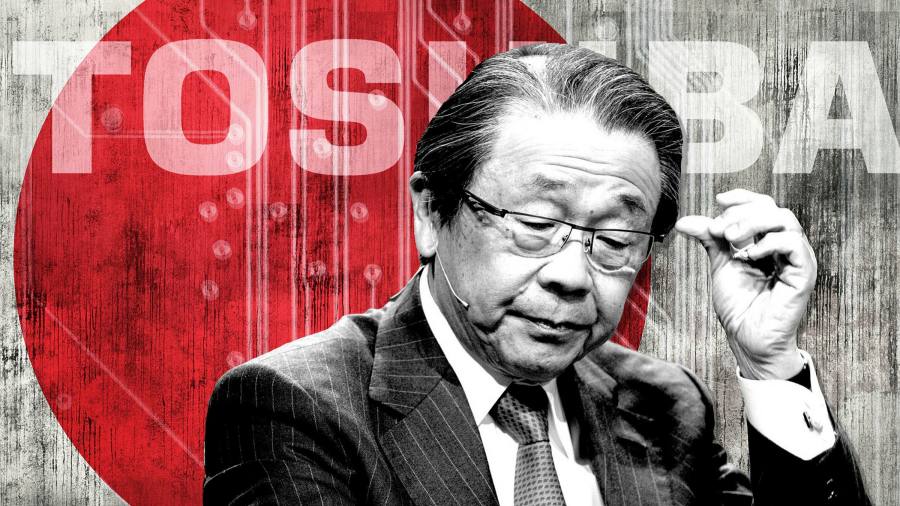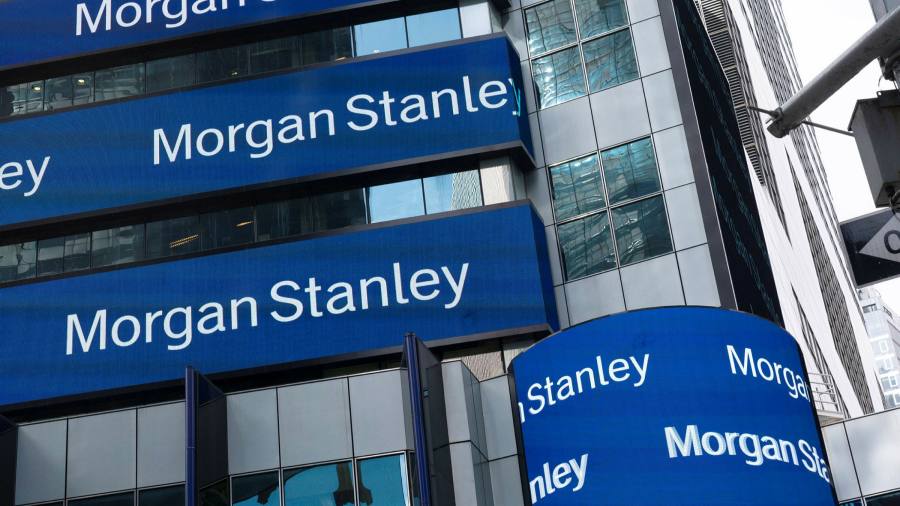[ad_1]
Japan had just declared itself in a state of national pandemic emergency, and Toshiba’s head of communications called an urgent meeting with two senior government officials to discuss a looming crisis. But coronavirus was not the issue. Was it legally possible, asked Masayasu Toyohara on April 11 2020, to “eliminate or control undesirable organisations and institutions?”.
No answer was forthcoming but Toyohara was referring, it has since emerged, to ways to silence Toshiba’s most outspoken shareholders.
Toyohara resigned this month — one of four initial casualties of an independent report into Toshiba’s collusion with government. It is a document that confirmed some long-held suspicions about the true backroom mechanics of corporate Japan and has now set the stage for the country’s most contentious annual shareholder meeting in decades. At its centre is the fate of Osamu Nagayama, the widely respected chair of Toshiba who faces being swept away by a mass shareholder revolt that could — in a single vote on Friday — sack the entire board of one of Japan’s most famous industrial names.
The broader impact could be even more serious. Toyohara’ s conversation with the unnamed director-general of the Ministry of Economy Trade and Industry (Meti), as described in the report, ended with a comment that threatens to unravel more than six years of Japanese efforts to present itself to global investors as eager for change and open to shareholder activism. Toyohara complained bitterly to Meti that despite supposedly stricter new national security rules on foreign investment, activists are “winning an environment that makes it even easier for them to operate”.
The findings of the 147-page report, described by some as a “new weapon” against the change-resistant quarters of corporate Japan, is yet another heavy blow for Toshiba. The 145-year-old conglomerate stands battered by six years of scandal, the struggle to return from near-bankruptcy, and the abrupt resignation of its “turnround” chief executive, Nobuaki Kurumatani, in April. But nothing, say investors, comes close to the implications of this report.
On June 10, a team of lawyers published the explosive independent account of the events surrounding Toshiba’s 2020 AGM and a vote where activist investors had threatened to oust Kurumatani. It provides granular detail on how Toshiba tried to influence voting behaviour to prevent such a profound embarrassment. The report was unlike any in Japanese corporate history for its detail, its capacity to make multiple parties look bad and its groundbreaking back-story of the collusion between the Japanese group and the government to suppress shareholders.
The report’s conclusion — that the 2020 AGM was conducted unfairly and involved what investors targeted by Toshiba and its allies describe as a “dark arts” campaign — has made government rhetoric on corporate governance and increased shareholder dialogue ring hollow.
With investors now lining up to punish the board with votes against Nagayama and other directors, Friday’s AGM will force the Japanese market — which remains eager to woo foreign investment — to confront a series of uncomfortable questions. Are Japanese standards of corporate governance fit for purpose? Is true alignment between management and shareholders a pipe dream? And is the situation at Toshiba a one-off?
“It is true that Toshiba is a special company, but foreign investors now feel uncertain about investing in Japanese stocks,” says Shin Ushijima, a lawyer and corporate governance expert. “This is not just a Toshiba problem, but an issue for Japan’s entire stock market.”
Holding the board to account
The Toshiba affair began in 2015 with the discovery of accounting fraud and pitched the company close to collapse two years later with the failure of its US nuclear business. An emergency issuance of $5.4bn of equity in 2017 stuffed its shareholder register with foreign activists, setting the industrial conglomerate on a collision course with shareholders demanding transparency, higher governance standards and a rise in corporate value.
Its vulnerability to activism alarmed the Japanese government. According to one Meti official, Toshiba — with its nuclear, semiconductor and quantum computing technology — is viewed “as a company like no other, with almost every single business deemed to have a national security sensitivity”.

There is no direct criticism of Meti in the report, but Toshiba is criticised for seeking its support in the company’s fight to suppress shareholders.
The great risk, says one veteran investor, is that the Toshiba report sets back perceptions of the Japanese market to the 1980s bubble era when it was assumed that it was systemically rigged against investors by backroom cabals. It has taken huge efforts to dislodge that image.
“Meti has actively promoted Japan’s corporate governance. In that sense, it has a responsibility that is bigger than other ministries to hold a dialogue with foreign investors. If not, it will have serious consequences for Japan’s capital markets,” adds Ushijima.
Under this uncomfortable glare, say managers at two large funds that hold Toshiba stock as part of global portfolios and only rarely vote against management, Friday’s AGM has become a referendum on where investors believe lines should be drawn and responsibility taken. It could mean that investors, needing to demonstrate their own pro-governance credentials, force the company to remove one of the few figures they would ordinarily trust to pull Toshiba out of its immediate problems.
Nagayama, who joined Toshiba after the 2020 AGM and received no criticism in the report, remains one of Japan’s most respected business leaders. His periods at Sony and Chugai Pharmaceutical are associated with rising share prices, greater focus on corporate value and positive engagement with shareholders.
Yet the AGM is now entirely focused on whether, as chair of the board and head of the nominations committee, Nagayama should be held responsible for the failure of Toshiba to conduct a thorough investigation of its own and be forced out.
3D, Toshiba’s second-largest shareholder, says that it remains concerned that Nagayama appears to be resistant to working with investors — perhaps because Toshiba remains institutionally unable to take their concerns seriously.

“Since the resignation of the former CEO [Kurumatani], Toshiba needs a strong leader who can work closely with shareholders from a clean slate. If you have a chair that you suspect is carrying legacy issues and not working for the shareholders, it is questionable if the chair appointed CEO will be focused on creating long-term value for the company,” said 3D in a statement.
In the wake of the lawyers’ report, Nagayama immediately removed from the slate at this Friday’s AGM two of the board candidates the report named as involved in the unfair conduct at the 2020 AGM. But many believe it is not enough. Even if other members of the 11-member board survive, the prospects for Nagayama do not look good.
The two proxy shareholder services, ISS and Glass Lewis, have recommended a vote against Nagayama’s re-election. Major institutional holders, including Norges Bank, the Florida State Board of Administration, Calvert and British Columbia Investment, have said they too intend to vote against him. Several other pension fund managers who attended an online Q&A session with Nagayama last week say they emerged “in no doubt” that they had to vote him out as a matter of principle.
“It’s the wrong guy [to punish], but for the right reasons,” says one manager.
A referendum on corporate Japan
Friday’s AGM is also a referendum on whether Japan is serious about governance reform. In 2013, less than a year after returning as Japan’s prime minister, Shinzo Abe rang the opening bell at the New York Stock Exchange and called on global investors to “buy my Abenomics” — the package of economic reforms designed to restore Japan’s fortunes.
Shareholder-friendly policies and a new governance code in 2015 were central to that push. Even more critical was a sense that Tokyo was finally admitting to its historical problems. Yet, in its bleakest segments, says a Toshiba investor, the independent report reads like a confirmation of every conspiracy theory that every fund manager has discussed in a Tokyo bar.
Toshiba’s travails

Apr 3 2015
Toshiba opens investigation into what would become a $1.3bn accounting fraud scandal
Dec 27 2016
Toshiba warns of a writedown of several billion dollars on its Westinghouse US nuclear business
March 29 2017
Westinghouse files for bankruptcy. It is sold in Jan 2018 for $4.6bn to Brookfield
Sep 28 2017
Toshiba sells its chip business for $18bn to a consortium led by Bain Capital
Feb 14 2018
Nobuaki Kurumatani appointed chief executive and chair
July 31 2020
Kurumatani narrowly survives vote at shareholder AGM
March 18 2021
Toshiba suffers defeat against activist investors in shareholder EGM, triggering the independent inquiry into the events of the 2020 AGM
April 14 2021
Kurumatani resigns amid fears that he might fail to win approval at AGM in June
June 10 2021
Toshiba releases 147-page independent report outlining collusion between the company and government designed to suppress shareholders
Some, though, see Toshiba’s most recent torment as a reason for cautious optimism. And they believe that its full-blooded “dark arts” efforts to suppress activists are a measure of how far activism has advanced in Japan over the past five years.
The independent investigation into Toshiba took place because the company’s largest shareholder — the secretive Singapore-based fund Effissimo, which owns 9.9 per cent of the group — was dissatisfied with the company’s in-house investigation into the 2020 AGM. It took the unusual step of calling an extraordinary general meeting in March to demand a fresh inquiry.
Despite Toshiba’s best efforts to resist that demand — including the decision to engage Goldman Sachs as an adviser — it lost the vote at the EGM and submitted to a double humiliation: the damning content of the independent report and how starkly it compared with the soft-touch internal report. The revelatory use of an EGM to mandate a lawyer-led investigation, says CLSA strategist Nicholas Smith, “is a major addition to the activist armoury that we are likely to see again soon”.
The report, using testimonies, emails, phone calls and other correspondence, alleges that the campaign against the activists was undertaken with the knowledge of the then cabinet secretary — now prime minister — Yoshihide Suga, a claim he denies.
Before the 2020 AGM, the question being asked was whether the activists would take Kurumatani’s scalp or would the government deploy its newly acquired powers under the revised Foreign Exchange and Foreign Trade Act, referred to in the report as the FEA, to thwart them. Toshiba — with its nuclear business — had been considered a critical test case for the revised law, which requires foreign investors including Effissimo to seek official approval before votes to elect individuals to the boards of Japanese companies deemed important to national security.

While government officials had firmly denied the law would allow companies to seek direct Meti interference to fend off activists, the report illustrates the extent to which Toshiba and government officials conspired to prevent Kurumatani from being ousted at the AGM. One Toshiba executive is quoted in an email as saying: “The revised FEA must be fully applied and operated to stop them [activists].” At a breakfast meeting with the same executive in July 2020, Suga is quoted in the report as saying: “If we are aggressive, we can get them with the FEA.”
In a text message to a Toshiba executive, Kurumatani also downplayed the role of its financial advisers in dealing with activists: “Meti will play the main role this time [2020]. There is a high possibility that Meti will be able to turn the activists away at the door this time, so it is quite possible that the FAs will not do much work.” After narrowly surviving the 2020 vote, Kurumatani resigned in April 2021 following a botched $20bn attempt by his former employer CVC to take over the Japanese conglomerate, which lifted its share price to a six-year high and continues to fuel speculation of other private equity bids.
Toshiba’s internal audit committee had earlier found that no pressure had been applied on shareholders ahead of the 2020 AGM. After publication of the independent report’s findings, Raymond Zage, a non-executive director of Toshiba, described the information previously provided to the board on the issue of Meti involvement as “highly misleading”.
Under pressure from shareholders, Toshiba on Monday disclosed the content of its own internal investigation, which confirmed sharing of information between the management and Meti on proposals by foreign investors but found no evidence of collusion. In a statement, Toshiba said it “sincerely accepts” the points raised in the independent report and pledged to “drastically improve its corporate governance”.
Yet, Meti officials have defended their role ahead of the 2020 Toshiba AGM, stressing the need to have a stable management for companies with critical technologies and important to national security.

“Meti is aware of the importance of corporate governance, so as a general policy, we would not respond in the same way to an individual company as we did this time,” Hiroshi Kajiyama, the minister of economy, trade and industry, told reporters following the report’s release. “But the actions we took were natural as Meti policy,” he added, noting that it would only involve itself in cases where national security was a concern.
The broader lesson
Nicholas Benes, one of the architects of the 2015 corporate governance code argues that while Toshiba is an outlier in many practical terms, the lessons of its crisis reveal important realities for every Japanese company and may even provide a positive lesson.
Toshiba is not typical, he says, because it is among a handful of companies Meti identifies as part of its national economy strategy. But it raises issues common to the rest of corporate Japan.
“It’s right to consider this a big event. It has ratcheted up significantly the expectation of shareholders and government and the public about doing things the right way,” says Benes.
It makes the response of Toshiba’s shareholders all the more critical. Having defended its intervention in Toshiba’s dealings with its shareholders, Meti will be unable to claim that it bears no responsibility if the company is suddenly left without a board of directors on Friday.
The challenge that awaits Toshiba is finding a new board that can appoint a chief executive to deal properly with shareholders and strive to manage a struggling group independently of government interference.
“Who will want to become CEO of Toshiba after all this?” asks one shareholder who has reduced his fund’s stake in the company following the recent turmoil. “Finding an exit for the remaining shareholders will also be hard.”
[ad_2]
Source link


